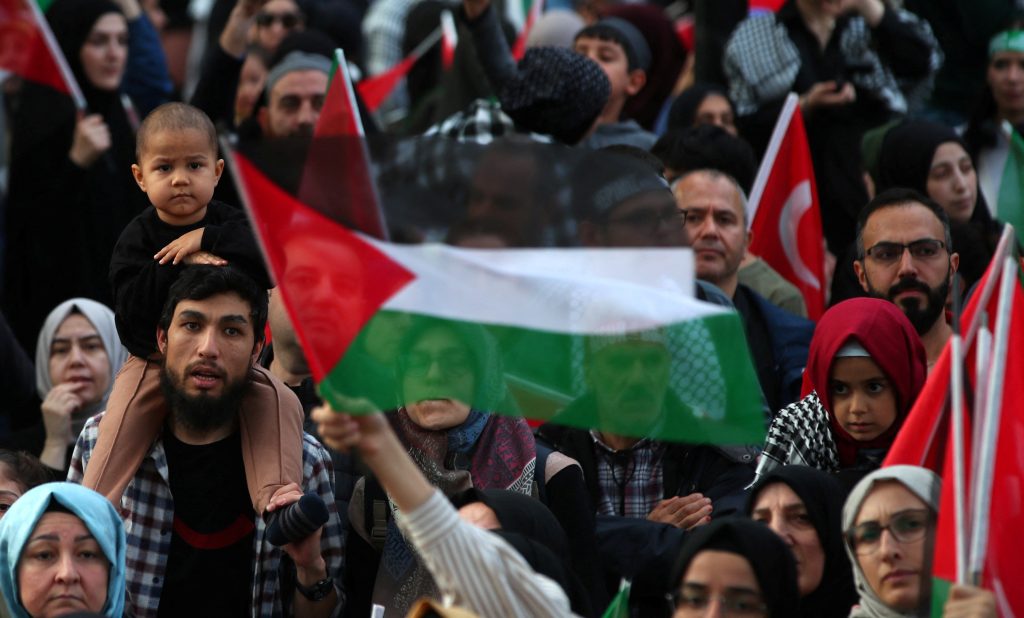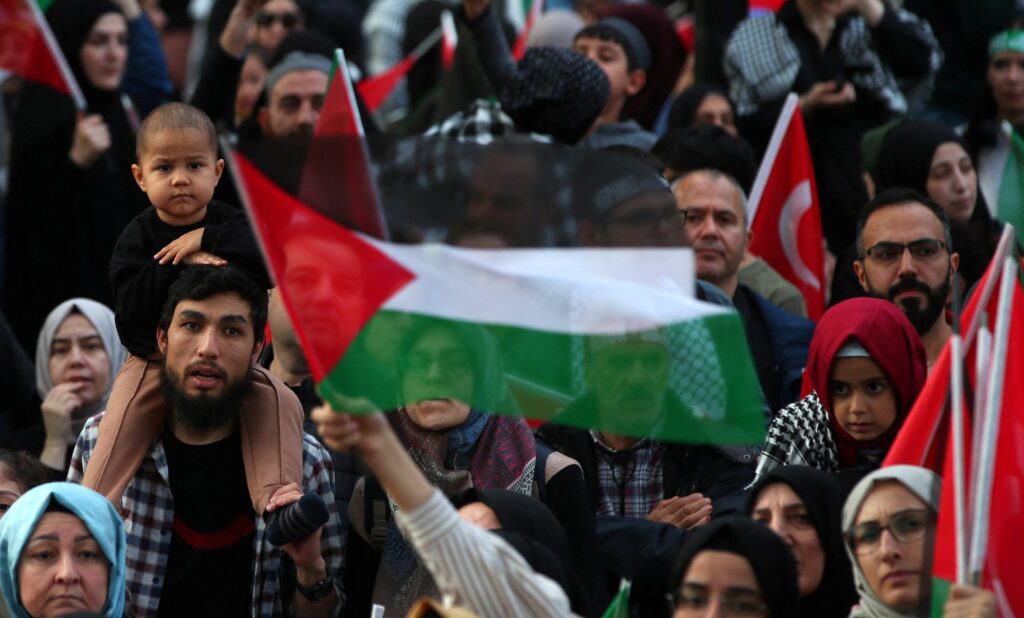
In October, Turkish President Recep Tayyip Erdogan faced calls to take a tougher stance against Israel’s military operation in Gaza and responded with a dramatic shift in rhetoric, but in doing so he also put Turkey’s interests and its credibility as a regional powerhouse at risk.
Following his October 25 remarks and those at the “Great Palestinian Conference” on October 28, Turkish citizens are wondering whether Erdogan’s party is trying to overshadow the historic 100th anniversary of the Republic. In any case, Erdogan seems to have changed his rhetoric, perhaps trying to capitalize on the heightened emotions of the rally participants and use the growing anger over Israel’s actions and US support for those actions to solidify his support. Given the high level of hostility towards Israel, Erdogan may have decided that it would be dangerous for Western countries to criticize Ankara for his remarks (as this could further inflame anti-Western sentiment). Doing so may have given him the opportunity to make a speech and appeal to his supporters.
Erdogan’s departure from the West, as seen in his remarks at the Palestine support rally, stands in stark contrast to his signing Sweden’s NATO accession protocol just days before the speech, sending it to parliament for final approval. While the Turkish parliament’s foreign affairs subcommittee has yet to vote on the matter, Erdogan’s move on the protocol appears strategically timed as a conciliatory offer to the West. However, neither the West nor Erdogan’s opponents are obliged to interpret and act on these developments as he wishes.
President Erdogan’s rhetoric, especially regarding Israel and the West, has evolved and contrasts with the more moderate and balanced foreign policy the president has advocated since 2020. After restoring diplomatic relations with Israel in 2022, the president began to choose his words carefully. For example, when Israel violently attacked the Jenin refugee camp in its war against terrorism in July this year, Erdogan stuck to issuing statements mainly through the Turkish Ministry of Foreign Affairs. When Hamas attacked Israel on October 7, killing around 1,200 Israelis, Erdogan initially called for calm, issued carefully documented statements, and even offered to mediate to end the conflict.
However, Erdogan’s choice of words has begun to evolve. In particular, after the October 17 explosion at Al-Ahli Hospital, which killed hundreds, the president rushed to place the blame for the attack on Israel and called on “all humanity” to stop the “unprecedented atrocities” in Gaza (the source of the explosion has yet to be confirmed, but intelligence agencies of the United States and other allies have clarified that, according to their assessment, it was not an Israeli attack). On October 25, Erdogan called Hamas a mujahideen and characterized it as a group of religious freedom fighters, not a terrorist organization. He also doubled down on his anti-Western rhetoric, accusing Israel of committing crimes against humanity. At the “Palestinian Grand Conference,” Erdogan said Turkey would “declare” Israel a “war criminal.” In response, Israeli Foreign Minister Eli Cohen ordered the return of Israeli diplomats from Turkey “to reassess Israeli-Turkish relations.”
Contrary to what Erdogan’s words may convey, a much larger proportion of Turkish citizens would prefer their government to remain neutral in the war than would support Hamas, according to the Metropol Center for Strategic Social Research (a poll conducted a few weeks before the Al-Ali Hospital explosion). The poll’s findings come as Turkey continues to struggle with alarmingly high inflation and the continuing depreciation of the lira, and as the government tries to balance priorities. At the moment, a war between Israel and Hamas is outweighed by priorities that directly affect Turkey’s economic stability and national security.
But Erdogan’s rhetoric has not always been matched by public actions that have left the door open to Israel. A week after Israel withdrew its diplomats for consultations, Erdogan summoned Turkey’s ambassador to Israel, Sakir Ozkan Trunlar, for talks but said he had not completely soured relations and that a “complete severance is not possible.”
Turkey has suspended plans for joint energy cooperation and exploration with Israel in the Eastern Mediterranean, but Erdogan did not reveal any other potential actions against Israel at the rally. Turkey-Israel trade ties have remained consistently strong despite the ups and downs of the bilateral relationship. Given Turkey’s economic problems, it will be difficult for Erdogan to unilaterally cut ties with Israel. The Turkish president finds himself in a predicament of his own making and has two options: further rally only those who support his new rhetoric and risk alienating those who still want to remain neutral in this war, or act cautiously and serve the interests of the country, thereby positioning his party for a strong showing in the 2024 local elections.
Erdogan’s comments have raised concerns that Turkey may unilaterally send troops to Gaza, which is unlikely. But a UN-recognized force could, and likely will, allow Erdogan to ensure a role for the Turkish military in protecting Palestinian civilians. Turkey has a track record of serving in multinational and NATO peacekeeping and military operations, including in Afghanistan and Bosnia-Herzegovina.
Turkey’s credibility as a regional power is also at stake. The more Turkey turns its back on the West, the less credible it will be in the region. Erdogan’s tough rhetoric will no longer have the support it enjoyed in the Arab world before the Arab Spring.
Now, President Erdogan must perform a difficult balancing act between exerting maximum influence from a neutral position and best serving his country’s political and economic interests.
Tulin Daloglu is a journalist based in Turkey. Follow him on Twitter: @TulinDaloglu.
References
Photo: Protesters march in support of Palestinians in the Gaza Strip, in Istanbul, Turkey, November 12, 2023, as the conflict between Israel and the Palestinian Islamist group Hamas continues. REUTERS/Dilara Senkaya


